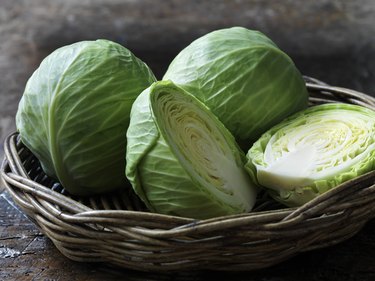
Vegetable cellulose is one reason vegetables are good for your health. It's a natural dietary fiber that keeps your digestive tract in good working condition and may help prevent some intestinal diseases. While it's a safe food additive, it sometimes attracts negative attention.
Tip
Vegetable cellulose is a type of insoluble fiber — an essential dietary nutrient that is healthy for you. But like many things in excess, too much fiber could be harmful.
Video of the Day
Like other types of fiber, such as pectin from fruit, cellulose is often extracted from plants, including tree bark, and used as a food additive. Don't let that stop you from enjoying vegetables and getting the full benefit of their nutrients and fiber.
Video of the Day
Read more: What Foods Contain Cellulose?
Get the Scoop on Cellulose
Polysaccharides are carbohydrates, such as starches or complex carbs, made from tens to thousands of sugar molecules connected together. Cellulose is also a polysaccharide, according to Colorado State University. It's found in all types of plants, where it stores sugar and forms the rigid structure that supports plant cell walls.
A variety of products, such as paper, cotton and wood, are made from cellulose. It is also used as an additive. Organic cellulose powder can be found in shredded cheese products, while microcrystalline cellulose is used in food as a thickener and bulking agent.
It is also used as a fat substitute and for anti-caking, according to a March 2016 article published by BioCrystals Journal. These diverse roles may make cellulose sound unappealing as a food, but if you eat fruits and vegetables, you will consume cellulose and gain the benefits.
Health Benefits From Cellulose
Cellulose is an insoluble fiber that your body doesn't have the enzymes to digest. As a result, sugar in cellulose is not used for energy like other carbs, but it still has important jobs to perform as it travels through your digestive tract.
The fiber absorbs water, which adds bulk and moisture to stool and helps prevent constipation. Like other types of insoluble fiber, cellulose may help prevent heart disease as well as lower your risk of diabetes and certain cancers, according to the Mayo Clinic.
Eating cellulose in food can also help reduce cholesterol, blood pressure and inflammation in the body. It could also help with weight management efforts as high-fiber foods tend to be more filling.
The recommended daily intake for total fiber, including insoluble and soluble, is 25 grams for women and 38 grams for men, according to the Mayo Clinic.
Read more: Why Can't You Digest Raw Vegetables?
Be Aware of Side Effects
You may experience side effects such as gas, bloating and diarrhea when you consume too much cellulose or suddenly increase the amount of fiber in your diet. According to the USDA, the amount of vegetables you should eat daily depends on several factors, including your age, sex and how active you are. In general, daily recommended intake is 1 to 3 cups.
If you don't already eat the recommended amount daily, you can limit the risk of side effects from increased fiber intake by adding them to your diet gradually. It's also important to drink plenty of water. Without sufficient fluids, high amounts of cellulose can make your stool harder and could lead to constipation.